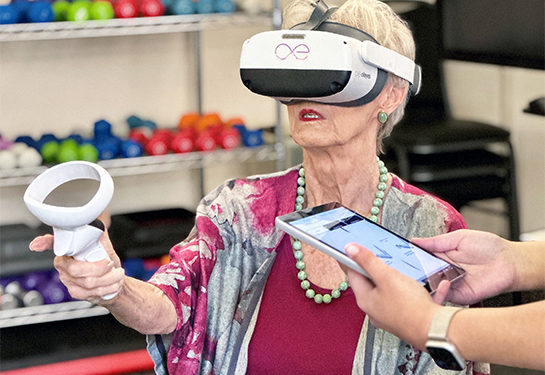Cerebrovascular Diseases
Our specialists provide comprehensive and lifesaving care for conditions that affect the blood vessels in your brain.
Medically reviewed by Ben Waldau, M.D. on Jan. 25, 2024.

Recognized Experts in Cerebrovascular Disease Care
As a leading center for cerebrovascular disease care, we offer emergency treatment, outpatient management and rehabilitation services with proven results. Our specialists are here for you at every step of your care journey.
Our Difference
Multispecialty Expertise
We bring together a team of specialists to ensure you receive the best possible care. Experts from neurosurgery, neurology, neuroradiology and interventional neuroradiology, emergency medicine and physical medicine and rehabilitation work together seamlessly on your behalf.
National Recognition
UC Davis Medical Center is ranked among the top hospitals in the nation for neurology and neurosurgery, according to U.S. News & World Report. We are also a Joint Commission-certified Comprehensive Stroke Center. These honors reflect our deep dedication to patient care, quality, and safety.
Leading-Edge Research
Our physicians and researchers are working to understand cerebrovascular disorders, develop better treatments and improve outcomes for patients. You may be able to access new treatments through our many clinical trials.
What Are Cerebrovascular Diseases?
Cerebrovascular diseases affect the blood vessels and circulation in your brain. They typically occur due to a narrowing, blockage or rupture of a blood vessel.
Some cerebrovascular diseases are caused by random or inherited genetic changes (mutations) that affect the structure of your blood vessels. Others are associated with health conditions and unhealthy lifestyle factors.
Types of Cerebrovascular Disease
Stroke
Strokes occur when a blood vessel in your brain becomes blocked (ischemic stroke) or bursts (hemorrhagic stroke).
It is a life-threatening event that requires emergency medical care. Learn the signs of stroke and when to call 911.
Transient Ischemic Attack (TIA)
In a TIA, you experience stroke symptoms for a short period of time. A TIA may be a signal of a future stroke. Seek immediate medical care even if your symptoms go away.
Brain Aneurysm
An aneurysm is a weakened section in a blood vessel wall that causes it to bulge. An aneurysm in your brain can burst and cause a hemorrhagic stroke.
Arteriovenous Malformations (AVMs)
AVMs are tangles of arteries and veins that can develop in your brain or spinal cord. Untreated, AVMs can reduce blood flow to surrounding tissues. They can also rupture, causing a hemorrhagic stroke.
Carotid Artery Disease
Your carotid arteries travel up either side of your neck, branching off to carry blood to your brain. Carotid artery disease is a narrowing of one or more of these arteries due to a buildup of plaque. It can cause an ischemic stroke if an artery becomes blocked.
Moyamoya Disease
Moyamoya disease is a rare, progressive condition in which the carotid arteries at the base of your brain become narrowed or blocked. It can cause a range of neurological symptoms and lead to an ischemic or hemorrhagic stroke.
Leading-Edge Care for Cerebrovascular Diseases
Our providers use advanced tools, including state-of-the-art neuroimaging, to make an accurate diagnosis and develop a personalized treatment plan. Whether you need surgery or routine monitoring, we listen to you and ensure your care meets your preferences and values.
Our Stroke Program provides rapid evaluation and treatment, and ongoing care and rehabilitation. We follow the latest protocols for stroke care, achieving excellent patient outcomes.
Your treatment plan may include:
Medications
Medications are often an important part of cerebrovascular disease treatment. They may be used to lower blood pressure, cholesterol and inflammation, and prevent blood clots. Medications given quickly after an ischemic stroke can dissolve the blood clot and improve your chance of recovery.
Minimally Invasive Brain Microsurgery
Our neurosurgeons are highly skilled in performing complex microsurgeries using an operating microscope and small instruments. They work precisely to open blocked arteries, stabilize aneurysms and remove AVMs, while avoiding essential areas of your brain.
Endovascular Neurosurgery
Endovascular neurosurgery treats cerebrovascular diseases from inside your blood vessels using thin tubes equipped with cameras and instruments. We perform a wide range of procedures, including embolization to block blood flow to aneurysms and angioplasty to open narrowed arteries.
Radiosurgery
Radiosurgery delivers radiation therapy from outside your body. Our neurosurgeons use Gamma Knife radiosurgery, which provides exceptional precision for removing or shrinking AVMs.
Rehabilitation and Support
Cerebrovascular diseases can damage your brain and impact your physical and emotional health. We offer physical, speech and occupational therapy, as well as psychological and social support to help you heal and get back to your life.
Request an Appointment
As Sacramento's No. 1 hospital, you'll benefit from unique advantages in primary care and specialty care. This includes prevention, diagnosis and treatment options from experts in 150 specialties.
Referring Physicians
To refer a patient, submit an electronic referral form or call.
800-4-UCDAVIS
Patients
Call to make an appointment.
Consumer Resource Center
800-2-UCDAVIS

Ranked among the nation’s best hospitals
A U.S. News & World Report best hospital in cardiology, heart & vascular surgery, diabetes & endocrinology, ENT, geriatrics, neurology & neurosurgery, and pulmonology & lung surgery.

Ranked among the nation’s best children’s hospitals
U.S. News & World Report ranked UC Davis Children’s Hospital among the best in pediatric nephrology, orthopedics*, and pulmonology & lung surgery. (*Together with Shriners Children’s Northern California)

Ranked Sacramento’s #1 hospital
Ranked Sacramento’s #1 hospital by U.S. News, and high-performing in aortic valve surgery, back surgery (spinal fusion), COPD, colon cancer surgery, diabetes, gynecological cancer surgery, heart arrhythmia, heart failure, kidney failure, leukemia, lymphoma & myeloma, lung cancer surgery, pacemaker implantation, pneumonia, prostate cancer surgery, stroke, TAVR, cancer, orthopedics, gastroenterology & GI surgery, and urology.

The nation’s highest nursing honor
UC Davis Medical Center has received Magnet® recognition, the nation’s highest honor for nursing excellence.

World-class cancer care
One of ~59 U.S. cancer centers designated “comprehensive” by the National Cancer Institute.

A leader in health care equality
For the 13th consecutive year, UC Davis Medical Center has been recognized as an LGBTQ+ Healthcare Equality Leader by the educational arm of America’s largest civil rights organization.

